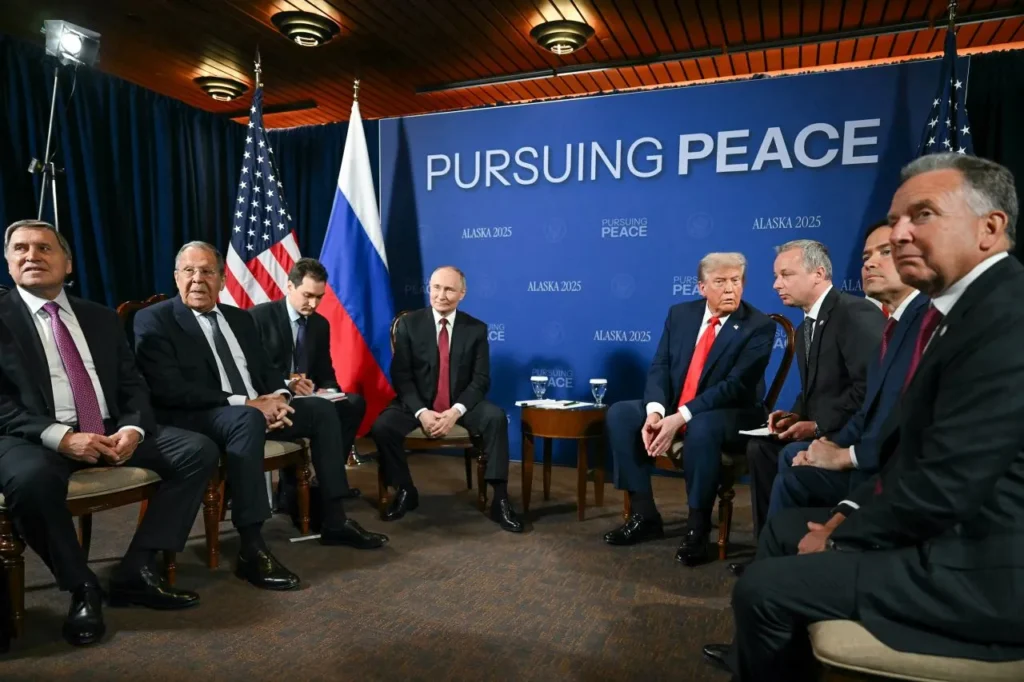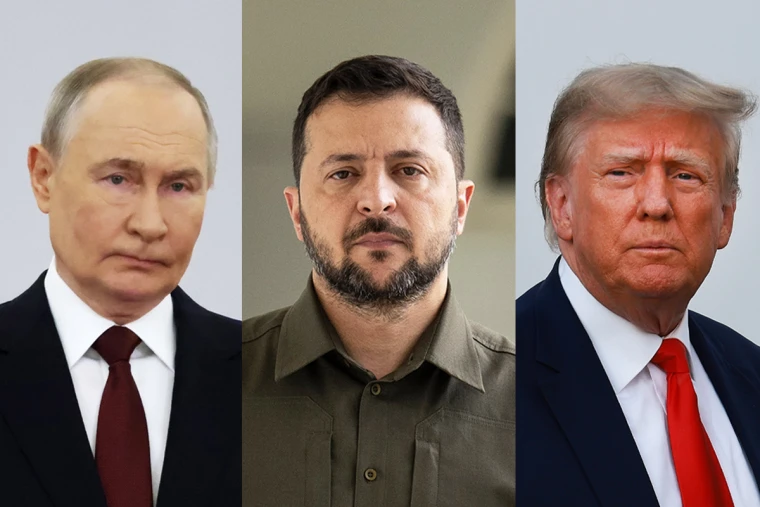Trump’s envoy says Putin is prepared to make concessions, including NATO-like security guarantees for Ukraine, ahead of a critical White House meeting with Zelensky and European leaders.
Table of Contents
Introduction
In a dramatic escalation of diplomatic maneuvering, former President Donald Trump’s top envoy, Steve Witkoff, revealed that Russian President Vladimir Putin signaled a willingness to make concessions during a recent summit in Alaska. The development comes just 24 hours before Ukrainian President Volodymyr Zelensky is set to meet Trump and key European allies at the White House, in what may be a turning point in the war.
Witkoff described “significant progress” in the talks with Putin, pointing to potential compromises on security guarantees and territorial disputes. However, European leaders and Zelensky remain cautious, demanding clarity and firm commitments before celebrating what could become the framework for peace.
What Did Trump’s Envoy Reveal?
Speaking on CNN’s State of the Union, Witkoff laid out four central concessions Putin allegedly made:
- Security Guarantees:
Putin signaled openness to “robust security guarantees” for Ukraine, enshrined in legislation. This would resemble NATO’s Article 5 defense clause without granting Ukraine NATO membership. - Limits on Expansion:
Russia would commit not to expand into Ukraine or elsewhere in Europe, if a peace framework is agreed. - Territorial Concessions:
Moscow may soften its stance on “land swaps,” suggesting discussions could focus on the current front lines rather than demanding entire regions outright. - Shift Toward Peace:
The concessions allegedly moved Trump away from his earlier call for an immediate ceasefire toward pursuing a comprehensive peace deal.
Witkoff hailed the development as the first time Russia had agreed to such sweeping provisions, calling it “a major breakthrough.”
Zelensky’s Response: Skepticism and Caution
At a press conference in Brussels, Zelensky made clear that promises alone are not enough.
- He questioned whether security guarantees would mean “troops on the ground” or air defense commitments.
- He emphasized that “Putin will not give us any security guarantees,” stressing reliance on U.S. and European enforcement.
- Zelensky reiterated his demand that any negotiations begin along the current battlefield front lines — not according to Moscow’s map.
“First we have to stop the killings,” Zelensky said, pushing for a ceasefire before deeper talks on territorial arrangements.
Europe’s Balancing Act
European leaders appear caught between cautious optimism and outright skepticism.
- Ursula von der Leyen (EU Commission President): Called Ukraine a “steel porcupine” that must be armed and guaranteed sovereignty. She insisted there can be no limits on Ukraine’s armed forces or alliances.
- German Chancellor Friedrich Merz & French President Emmanuel Macron: Stressed that peace talks must preserve Ukraine’s territorial integrity.
- British Prime Minister Keir Starmer: Pledged that the UK would support Ukraine “for as long as it takes.”
- Nordic Baltic Eight: Reiterated that a ceasefire must precede negotiations, underlining distrust of Moscow’s intentions.
Analysts note that Europe is scrambling to influence Trump’s rapidly evolving strategy, with many unsettled by his reversal from ceasefire-first to peace-deal-first.
What Putin Wants
Despite talk of concessions, Putin’s bottom line has remained largely consistent:
- Territory: Russia still seeks control over the Donbas region, while potentially freezing the front lines in Kherson and Zaporizhzhia.
- Neutral Ukraine: Kyiv must abandon NATO ambitions and scale down its military.
- End of Sanctions: Moscow wants relief from Western economic pressure.
European officials privately warned that Putin gave away little in Alaska, while Moscow declared the meeting a diplomatic victory.
Trump’s High-Stakes Gamble
Trump has framed his diplomacy as a breakthrough that could end the war faster than his predecessors. By pushing for a trilateral peace framework — the U.S., Ukraine, and Russia — he hopes to secure what he calls a “permanent solution.”
But critics warn:
- His willingness to bend on NATO membership could embolden Moscow.
- Skipping a ceasefire could risk continued fighting during fragile negotiations.
- Alienating European allies could fracture Western unity.
Still, Trump has teased “BIG PROGRESS” on social media, stoking anticipation ahead of Zelensky’s White House visit.

Tomorrow’s White House Summit: Who’s Attending?
Confirmed attendees include:
- Volodymyr Zelensky (Ukraine)
- Donald Trump (U.S.)
- Emmanuel Macron (France)
- Friedrich Merz (Germany)
- Giorgia Meloni (Italy)
- Ursula von der Leyen (EU Commission)
- Alexander Stubb (Finland)
- Mark Rutte (NATO Secretary General)
- Keir Starmer (UK Prime Minister)
The meeting could define the next phase of war or peace in Ukraine.
Analysis: Can Putin Be Trusted?
History complicates optimism. Moscow has repeatedly violated ceasefires and treaties, from Crimea in 2014 to its full-scale invasion in 2022.
Experts caution that:
- Russia could use talks to regroup militarily.
- Security guarantees without NATO’s direct involvement may lack credibility.
- Territorial concessions may undermine Ukraine’s sovereignty long-term.
Still, some analysts argue that any framework reducing violence — even temporarily — could buy Ukraine time to rebuild and rearm.
What’s Next?
- White House Talks: Tomorrow’s summit may deliver the first draft of a peace framework.
- Zelensky’s Demands: Ukraine will push for clarity on military support and Western enforcement of security guarantees.
- Europe’s Pressure: EU leaders will try to prevent Trump from striking a deal that sacrifices Ukrainian sovereignty.
- Putin’s Calculations: Russia may stall, betting that drawn-out negotiations weaken Western resolve.
FAQs
1. What concessions did Putin make in Alaska?
According to Trump’s envoy, Putin agreed to security guarantees for Ukraine, legislative commitments against further expansion, and softer positions on territorial swaps.
2. How did Zelensky react?
Zelensky expressed skepticism, demanding clarity on what guarantees mean in practice and insisting negotiations must start at the current front lines.
3. What role are European leaders playing?
Europe is pressing for a ceasefire-first approach, wary of Trump’s shift toward immediate peace talks without halting fighting.
4. Will Ukraine be allowed to join NATO?
Putin continues to block NATO membership. Trump’s envoy proposed a NATO-like security guarantee instead, but Ukraine’s acceptance remains unclear.
5. What happens at the White House meeting?
Zelensky, Trump, and top European leaders will meet to discuss a possible peace deal framework. The outcome could shape Ukraine’s future sovereignty and security.
